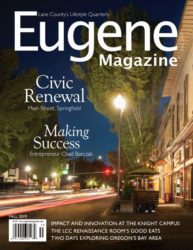[Editor’s Note – As of October 2022, the Eugene Whiteaker International Hostels have changed ownership.]
Adventure-seeking travelers on small budgets are often big fans of hostels. Hostel accommodations tend to offer amenities unavailable in typical, cookie-cutter hotel/motel settings: Inexpensive lodging, unique character, close connection to compatriot travelers and ground-level exposure to local communities.
The Eugene Whiteaker International Hostels, known individually as Hostel Oz and Emerald Garden Guest House, offer all that and more.
Mac Hines, the steady-handed owner and manager of the hostels, has slowly built his hospitality business “one or two beds at a time” since first settling into Eugene’s Whiteaker neighborhood in 2006. The Guest House and Hostel Oz both reflect Hines’ influences as a host, carpenter, band musician, sailor, gardener, green-lifestyle advocate, and intermittent traveler. “The hostels have never been a huge money maker,” says Hines, “but they’re sustainable. Consistent. And the business grows a little every year.”
Oz currently accommodates 26 visitors a night. Guests sleep in a variety of room configurations ranging from 4-bed dorms with shared baths to private rooms with private bathrooms. The “more homey, more farmy” Garden House resembles a bed and breakfast inn. It houses 12 guests. Prices in both places range from $30-38 a night. Most reservations are made via online booking sites including TripAdvisor, Hostelling International, and Airbnb.
According to Hines, his guests range in age from 18-80. International travelers account for more than half of all his visitors. The mix is eclectic and colorful. A large world map in the OZ kitchen spotlights the home countries of many former guests; pushpins are scattered across every continent.
A few yards away, several guests are preparing dinner. A couple trades rhythms on house drums in an adjacent room where a young man also tinkers on a piano. Another pair is caught up in a chess match. In the backyard, with its small stage and amphitheater seating, guests and staff hangout together and socialize. Some are reading. Others are chatting, likely sharing stories of their road adventures.
“This,” says Hines, “is about living together on a very small footprint. It’s smart, high-density, low-impact living. And it’s about high-quality hospitality.”


